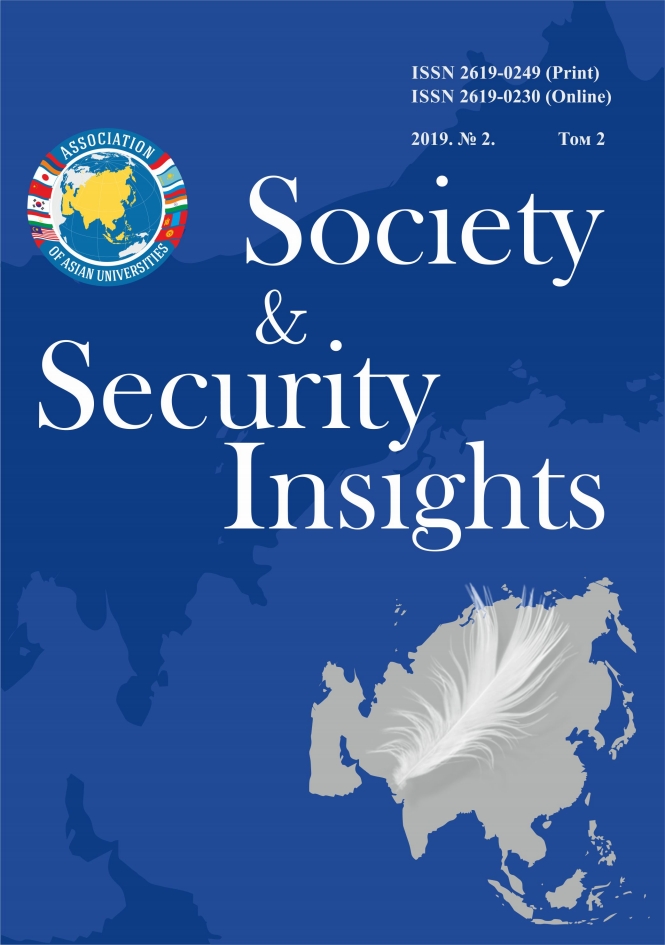EXPRESSIONS OF THE TRUST TO CIVIL SOCIETY INSTITUTES IN REGIONS OF THE RUSSIAN-ASIAN BORDERLAND
Main Article Content
Abstract
The aim of the article is to consider the peculiarities of the trust among population of four border regions of Russia to the civil society institutes. The paper relies on data of sociological research in four Russian regions (the Altai region, the Trans Baikal region, the Kemerovo oblast and the Orenburg oblast) in 2018. It is concluded that the trust to civic institutes is rather expressed, but has as regional as other peculiarities, determined by social-demographic characteristics of respondents and corresponding civic identities. In total, social trust of population could be distributed into three groups of institutes: the sense of the first one is given by classic democratic public-political formations, the second one — by spiritual-ethnic-cultural unions, the third one — by socially important public institutions.
Downloads
Metrics
Article Details

This work is licensed under a Creative Commons Attribution-NonCommercial-NoDerivatives 4.0 International License.
Authors retain the copyright of their manuscripts, and all Open Access articles are distributed under the terms of the Creative Commons Attribution License, which permits unrestricted use, distribution, and reproduction in any medium, provided that the original work is properly cited.
References
Купрейченко А.Б., Мерсиянова И.В. (Ред.). Доверие и недоверие в условиях развития гражданского общества. М.: Издательский дом НИУ ВШЭ, 2013.
Натхов Т. Образование, социальный капитал и экономическое развитие (обзор основных исследований). Вопросы экономики, 2010, No. 8, 112–122.
Партс И. Роль социального капитала в экономическом развитии переходных стран. Диалог, 2008. URL: http://dialogs.org.ua/ru/cross/page13246.html (дата обращения 12.05.2019).
Фукуяма Ф. Доверие: социальные добродетели и путь к процветанию. Пер. с англ. М.: АСТ; Ермак, 2004.
Alexander J.C. Democracy and Civil Society. Mimeo, Los Angeles: UCLA, 1992.
Bourdieu P. The Forms of Capital. In: Handbook of Theory and Research for the Sociology of Education. Ed. J.G. Richardson. N.Y.: Greenwood Press, 1986.
Coleman J.S. Social Capital in the Creation of Human Capital. American Journal of Sociology, 1988, Vol. 94, 95–120.
Knack S., Keefer P. Does social capital have an economic payoff? A cross-country investigation. Quarterly Journal of Economics, 1997, 112(4), 1251–1288.
Maximovа S., Noyanzina O., Omelchenko D., Maximova M. The trust as a social capital of civil society in contemporary Russia. MATEC Web of Conferences, 2018, 212, 10004. ICRE 2018. http://doi.org/10.1051/matecconf/201821210004 (дата обращения 12.05.2019).
Misztal B. Trust in Modern Societies. Cambridge: Polity press, 1996.
Putnam R. Making Democracy Work: Civic Traditions in Modern Italy. Princeton University Press. NY: Princeton, 1993.
Seligman A.B. The Problem of Trust. Princeton, 1997.
REFERENCES
Kozyreva, P.M., Smirnov, A.I. (2010). Doverie i ego rol’ v konsolidacii rossijskogo obshchestva [Trust and its role in consolidation of the Russian society]. In M.K. Gorshkov (Ed.), Social’nye faktory konsolidacii Rossijskogo obshchestva: sociologicheskoe izmereni [Social factors of consolidation of the Russian society: sociological dimension] (pp. 160–199). Moscow: Novyj hronograf.
Kuprejchenko A.B., Mersiyanova I.V. (Eds.) (2013). Doverie i nedoverie v usloviyah razvitiya grazhdanskogo obshchestva [Trust and mistrust in terms of civil society development]. M.: Izdatel’skij dom NIU VSHE.
Nathov, T. (2010). Obrazovanie, social’nyj kapital i ekonomicheskoe razvitie (obzor osnovnyh issledovanij) [Education, social capital and economic development (overview of major approaches)]. Voprosy ekonomiki. № 8.
Parts, I. (2008). Rol’ social’nogo kapitala v ekonomicheskom razvitii perekhodnyh stran [The role of social capital in the economic development of transitional countries]. Dialog. URL: http://dialogs.org.ua/ru/cross/page13246.html (Accessed 12.05.2019).
Fukuyama, F. (2004). Doverie: social’nye dobrodeteli i put’ k procvetaniyu [Trust: The Social Virtues and The Creation of Prosperity]. Translated from English. M.: AST; Еrmak.
Alexander, J.C. (1992). Democracy and Civil Society. Mimeo, Los Angeles: UCLA.
Bourdieu, P. (1986). The Forms of Capital. In. Handbook of Theory and Research for the Sociology of Education. Ed. J.G. Richardson. N.Y.: Greenwood Press, 1986.
Coleman, J.S. (1988). Social Capital in the Creation of Human Capital. American Journal of Sociology, 94, 95–120.
Knack, S., Keefer, P. (1997). Does social capital have an economic payoff? A cross-country investigation. Quarterly Journal of Economics, 112(4), 1251–1288.
Maximovа, S., Noyanzina, O., Omelchenko, D., Maximova, M. (2018). The trust as a social capital of civil society in contemporary Russia // MATEC Web of Conferences 212, 10004. ICRE 2018. URL: http://doi.org/10.1051/matecconf/201821210004 (Accessed 12.05.2019).
Misztal, B. (1996). Trust in Modern Societies. Cambridge: Polity press. Putnam, R. (1993). Making Democracy Work: Civic Traditions in Modern Italy. Princeton University Press. NY: Princeton.
Seligman, A.B. (1997). The Problem of Trust. Princeton.


 https://orcid.org/0000-0002-1252-6021
https://orcid.org/0000-0002-1252-6021